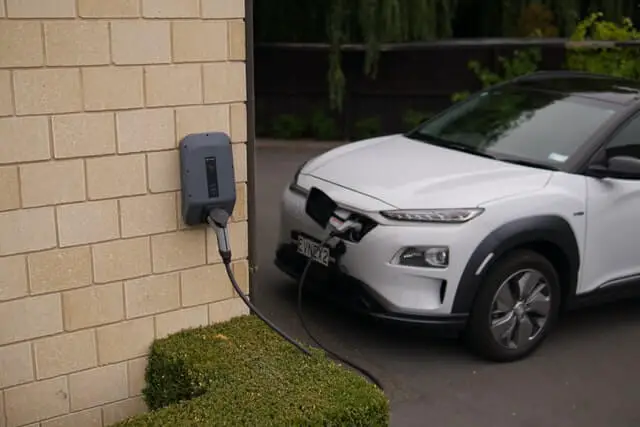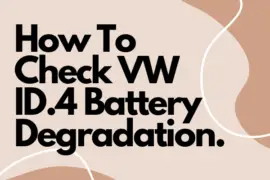Last Updated on July 5, 2024 by Rose Morah
Before installing an electric vehicle charging station at home, there are a few important things you need to know, which this article will cover in-depth.
Here is what we will cover in this article:
- What to consider before installing an EV charger.
- EV charger installation cost.
What to consider before installing an EV charger
1. The size of your cut-out fuse
This is the first thing that your electrician will probably need to find out.
EVs use a lot of power to charge, sometimes even almost half of your entire house power supply. The electrician will, therefore, need to know the load put on to your system by your electric vehicle charger.
Additionally, if you have multiple things in your house that rely on the main power supply, the fuse may end up burning out and losing power to your house.
This is why you will need to let your qualified electrician know the size of the main fuse to know if it is the right amp size that can comfortably charge your EV from home without any issues.
What’s the recommended fuse amp for EV charging from home?
100 amps. If below that, normally your electrician will first ask you to upgrade it.
Where is the cut-out fuse located?
The cut-out fuse is located at your meter box where your meter is.
2. Are you and your neighbor sharing the power supply?
If you are sharing a power supply, then it means that there’s a limit of power and you might not be able to upgrade your main fuse.
To find out if you are sharing a power supply, check if there are two cables going into the cut-out fuse. If yes, then you are sharing.
If there’s only one cable going into the cut out then you are not sharing power.
You can also take a pic of your meter box and send it to the electrician. He/she should be able to tell you.
So, what happens if you are sharing power with your neighbor?
3. Safety checks
A qualified electrician will need to do some safety checks before installing the EV home charger.
Here are a few of the safety checks:
If you have gas on your property, they will need to check if it is bonded – it should have an earthing/bonding clamp installed.
Check also if the main water supply to the house is bonded. It should also be bonded.
See also: 5 Best Electric Car Charging Cable Protector.
4. Do you have extra space in the breaking box/fuse box/consume unit?
The electrician will need to find out:
- If there a spare way in your fuse box/breaking box/consume unit
You should have a spare way. If not, then it will be challenging for the electrician because he/she will then need to find out how to create a way for the EV charger.
What happens if the electrician is not able to create a way on the fuse box?
Well, he will need to install an additional fuse box close/right next to your existing fuse box.
This means that he will also have to find out whether you have space that can fit the new fuse box.
- The type of fuse/breaking box you have
Do you have the old or newer model fuse box?
If it is an old fuse box, check whether it needs to be replaced with a newer fuse box.
This is important because it could help prevent fire or items from getting blown up, especially if you have an old fuse.
5. Your home EV chargepoint
So, once the electrician has all the above information, the next thing is to find out where exactly you will like to install the EV home charging point.
Here are a few tips to help you make the right decision:
- Depending on where the charging port of your EV is located, you can install the home charger at the closest point to your EV charging port. This can help keep the cable length to the EV charging port as short as possible.
- Depending on where you park your EV at home, you can install the charger at a point where you can safely charge overnight without any worries.
- Which is the easiest route from the fuse box to the EV home charger? Figure out a charging point that will not take a lot of labor, but will still be convenient. This will help save you on installation costs.
See the different types of electric vehicles (EVs) and which one you should buy.
6. What charging speed best suits your needs?
So, when it comes to the speed of the charger, you will need to figure out which one best suits your daily needs.
This means that, if you cover only a few miles in a day, then you don’t need to go for a faster charger.
This is because you can charge overnight even with a slower charger and still be able to get a full charge by morning on most EVs.
Additionally, even if your car is not fully charged by the following day, which is rare, you will still be able to drive confidently.
So, who should get the high-speed EV home charger?
Anyone who covers many miles on daily commutes or uses their cars for deliveries e.tc.
| If you want to install a high-speed home charger, then you will need to know the battery capacity of the vehicle’s onboard charger. This is because the vehicle can only receive a certain amount of charge no matter how fast your wall charger is. For example, your vehicle is limited to 11kW and you have a 22kw wall charger, it will only charge up to 11kW. |
See also: How Long Does it Take To Charge Chevy Bolt (Complete Charging Guide).
7. If you want to save on electricity bills
Investing in a smart charger can help save your electricity bills. Additionally, it provides you with better features for a good user experience.
Wondering how you can save on electricity bills when charging your EV from home?
- Most smart chargers have solar integration. This means that if you have solar panels you can easily set it up to charge your EV purely from green electricity for free.
- Smart charger gives you the option to set the charging time, which is great especially if you live in locations with off-peak hours. You are hence able to save on your electricity bills by charging during off-peak hours when elecricity cost is low.
- Most smart chargers have an app that helps you monitor the amount of electricity consumed. You are hence fully aware how much you are paying to charge your EV from home, and whether it is really worth it.
See also: How Much it Cost to Charge an EV in California (Tips for Saving on EV Home charging in California).
EV charger installation cost
What’s EV charger installation cost?
There is really no exact cost of the EV charger installation. However, there will be a higher cost of installation:
- If you have no space on the current fuse box/consuming unit.
- If the fuse box/consuming unit is far from the charging point. It will be more costly if there will be more groundwork for the charging route.
- If it will require a lot of equipment to install, like load limiters.
Your electrician will give you a quotation based on the ease of installation as well as the cost of installation equipment that will be needed.
See these 10 Cheapest EV Home Chargers (Under $500).
| If you are on a tight budget, I would recommend buying a smart charger that is easy to install. A good example is the new Ohme system which is the easiest to install since the electrician will not need to open the box. |




